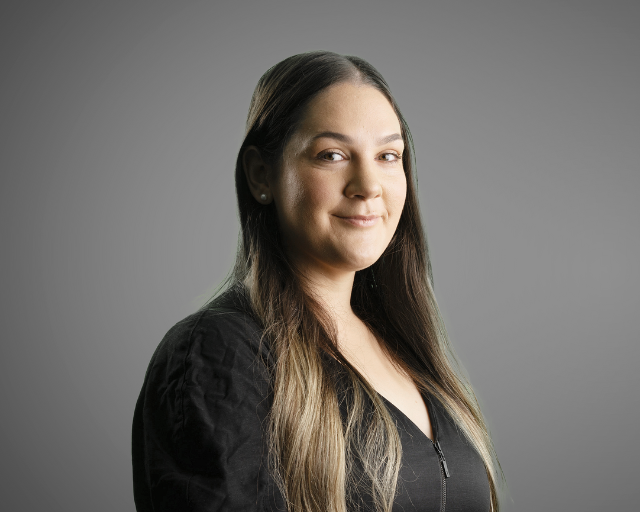
MASTER OF LAWS (APPLIED LAW) MAJORING IN DISPUTE RESOLUTION
- 8 subjects
- $4,150 per subject
- FEE-HELP eligible
- 2 years part-time
- 4 intakes per year: Feb, May, Aug, Nov
HELP PEOPLE AVOID THE COSTLY EXERCISE OF GOING TO COURT
With more and more legal issues being resolved before court, advanced dispute resolution skills have never been so valuable. You will protect clients from the traditional court system. And instead, steer them towards less adversarial alternatives. This can involve a variety of methods including mediation, family dispute resolution and collaborative law. What’s required to thrive in this specialisation? High-level communication, problem-solving and empathy.
A Master of Laws (Applied Law) majoring in Dispute Resolution sets students up with strong problem-solving and experiential focus, and allows students to put their knowledge into practice through role-plays and case studies with negotiation, mediation, conciliation, arbitration, communication and more.
To enrol in this award, you must choose:
- 3 DRP subjects
- 4 elective subjects or a second major
- Capstone project in Dispute Resolution
* Current Nationally Accredited Mediators are eligible for advanced standing for the DRP4 Mediation subject.
Plan your studies
Looking to plan your postgraduate program?
- Use the tool below to explore subjects by practice area and intake date.
- Prefer to review offline? Download the full PDF for a complete overview of all your options.
HOW TO ENROL
Follow these steps to complete your enrolment in a postgraduate program.
- Choose your first subject
We recommend enrolling in one subject per intake. Enrolling in two subjects may require up to 25 hours of study per week. - Gather your documents - You'll need your documents to upload when completing the online enrolment form
- Academic Records : You’ll need to submit one of the following:
- Official academic transcript (LLB, JD, Dip Law)
- Graduation certificate
- Admission certificate
- Current practising certificate
- Recognition of prior learning (if applicable)
- Submit any relevant postgraduate certificates or qualifications if applying for RPL.
-
- Recognition of prior learning (if applicable)
Submit any relevant postgraduate certificates or qualifications if applying for RPL. - Proof of name change (if applicable)
If your name has changed, provide certified proof. - Unique student identifier (USI)
A USI is required by the Australian Government for all students (except offshore international students). Create or find your USI here.
- Recognition of prior learning (if applicable)
- Payment or financial assistance
Have your payment details or tax file number (TFN) ready if applying for FEE-HELP through the Commonwealth Government FEE-HELP scheme. - Submit your enrolment
Once ready, complete and submit your online enrolment.
Need help?
For assistance, contact Customer and Student Engagement at 1300 506 402 or enquire online.
RE-ENROLMENTS
Re-enrolling for your next subject is simple!
Once you've enrolled in your chosen Award program, re-enrolling for the next subject is easy. Simply follow these steps:
- Choose your next subject.
- Log in to the customer portal.
- Complete the re-enrolment form and select your payment option.
FEES & FEE-HELP
Here’s what you need to know:
- The fee per subject in 2026 is $4,150 (no GST applies)
- Our fees are reviewed annually and may vary during your enrolment
- You need to pay your fees in full at the time of enrolment each semester.
- We accept cheque, EFT and credit card.
StudyAssist FEE-Help
- If you’re an Australian citizen, NZ citizen or you hold a permanent humanitarian visa, you may be able to defer payment through the Australian Government StudyAssist FEE-HELP scheme. Learn more about FEE-Help or visit the Australian Government StudyAssist FEE-HELP scheme website.
Good news! There’s no need to pay for your entire qualification upfront. Instead, you can pay as you learn – subject by subject. Which means, you can start off small by building your own Graduate Certificate, or Graduate Diploma, and then progress to a Master of Laws later, if you choose.
Please refer to our Policy Index - 1.3.11 Withdrawal policy.
Kay Smith Scholarship
The Kay Smith Scholarship honours one of the longest serving and most respected people of The College of Law. It is designed to support the education aspirations of outstanding law graduates and young lawyers. Learn more.
PREREQUISITES
You must hold a recognised law degree (LLB, JD, or equivalent) to enrol in a Postgraduate Program.
ASSESSMENTS
Your assessments may vary from course to course. However, these are the most common assessments that you will need to complete:
- Oral Assessments
- Written Assessments
- Short writing activities
- Reflection activities
For all student policies refer to our policy index.
RECOGNITION OF PRIOR LEARNING
If you’ve already completed relevant study, you could be closer to your Master’s than you think. With Recognition of Prior Learning (RPL), you may be eligible for credit towards our postgraduate programs, fast-tracking your journey to a Master’s degree.
Graduate Diploma of Legal Practice (PLT)
-
Completed with The College of Law (within the last 10 years)
Already completed your Graduate Diploma of Legal Practice (PLT) with The College of Law in the past 10 years? You could have up to two elective subjects of unspecified credit towards the Master of Laws (Applied Law)—meaning you’re already a step closer to completing your Master’s. -
Completed with Another Provider (within the last 10 years)
If you've earned your Graduate Diploma of Legal Practice with another provider in the last 10 years, you could gain one elective subject of unspecified credit towards the Master of Laws (Applied Law). That’s one less hurdle between you and your Master’s.
DISPUTE RESOLUTION SUBJECTS
DRP00 - Capstone Project (Dispute Resolution)
Intake 2, 4TOPICS
THE SUBJECT HAS FOUR COMPONENTS
- Four short answer questions
- Two legal writing samples
- Oral communication (e.g. client interview) assessment held through online conferencing
- Reflective analysis
DRP1 - Foundations of Dispute Resolution
Intake 1, 3TOPICS
- Background to dispute resolution
- Preparing for negotiation
- Managing negotiation
- Preparing for mediation
- Managing mediation
- Conciliation
- Expert determination
- Arbitration
- Litigation and finalising resolution agreements
DRP2 - Negotiation
Intake 2, 4TOPICS
- Introducing negotiation
- Models of negotiation
- Preparing for negotiation Implementing a planned negotiation
- Managing the negotiation process
- Applying critical communication skills to negotiation
- Managing challenging issues in negotiations
- Negotiating ethically
DRP3 - Advocacy
Intake IntensiveTOPICS
- Fundamentals of advocacy and the advocate's role
- Ethics and an advocate's duty to the client and the court
- Rules of evidence
- Examination-in-chief
- Witnesses (lay and expert) and interpreters
- Cross-examination and re-examination
- Submissions and arguments
DRP4 - Mediation
Intake IntensiveThis subject discusses where mediation sits on the dispute resolution spectrum and how the process assists in the resolution of disputes. The mediation process and the skills used by mediators within the mediation process, are also discussed. This is an intensive subject with pre-work followed by a compulsory four day intensive workshop. This course structure satisfies the requirements under the NMAS. The College of Law offers the National Mediation Assessment. Find your course here.
* Current Nationally Accredited Mediators are eligible for advanced standing for this DRP4 Mediation subject.
TOPICS
- The dispute resolution spectrum
- Conflict analysis and pre-mediation preparation
- Mediation models and processes
- Communication skills and mediation
- Facilitative mediation
- Mediating a matter
START DATES
| Feb Intake 1 | May Intake 2 | Aug Intake 3 | Nov Intake 4 | |
|---|---|---|---|---|
| START DATE | 09 Feb 2026 | 11 May 2026 | 10 Aug 2026 | 09 Nov 2026 |
| CENSUS | 25 Feb 2026 | 27 May 2026 | 26 Aug 2026 | 02 Dec 2026 |
| END DATE | 01 May 2026 | 31 Jul 2026 | 30 Oct 2026 | 05 Feb 2027 |
| Subject | Start Date | Census | End Date | Workshop Date |
|---|---|---|---|---|
| DRP3 - Advocacy | 21 Sep 2026 | 30 Sep 2026 | 30 Oct 2026 | |
| DRP4 - Mediation | 19 Jan 2026 | 28 Jan 2026 | 27 Feb 2026 |
9 - 13 February 2026 |
| FDR1 - Family Law and Mediation | 09 Feb 2026 | 18 Feb 2026 | 20 Mar 2026 |
Intake 1 |
| FDR1 - Family Law and Mediation | 10 Aug 2026 | 19 Aug 2026 | 18 Sep 2026 |
Intake 1 |
| FDR2 - Children’s Matters, Family Law and Family Dispute Resolution | 23 Mar 2026 | 01 Apr 2026 | 01 May 2026 |
Intake 1, 2026 Intake 2, 2026 |
| FDR2 - Children’s Matters, Family Law and Family Dispute Resolution | 21 Sep 2026 | 30 Sep 2026 | 30 Oct 2026 |
Intake 1, 2026 Intake 2, 2026 |
| FDR3 - Advanced Family Dispute Resolution | 04 May 2026 | 13 May 2026 | 12 Jun 2026 |
Intake 1, 2026 Intake 2, 2026 |
| FDR3 - Advanced Family Dispute Resolution | 02 Nov 2026 | 11 Nov 2026 | 11 Dec 2026 |
Intake 1, 2026 Intake 2, 2026 |
| FDR4 - Case Management in Family Dispute Resolution Capstone | 26 Jan 2026 | 04 Feb 2026 | 06 Mar 2026 |
Intake 2, 2025 Intake 2, 2026 |
| FDR4 - Case Management in Family Dispute Resolution Capstone | 15 Jun 2026 | 24 Jun 2026 | 24 Jul 2026 |
Intake 2, 2025 Intake 2, 2026 |
| FDR4 - Case Management in Family Dispute Resolution Capstone | 25 Jan 2027 | 03 Feb 2027 | 05 Mar 2027 |
Intake 2, 2025 Intake 2, 2026 |
| FDR5 - Virtual Simulated Practice | 06 Apr 2026 | 16 Apr 2026 | 29 May 2026 |
Intake 1, 2026 Intake 2, 2026 |
| FDR5 - Virtual Simulated Practice | 07 Sep 2026 | 17 Sep 2026 | 30 Oct 2026 |
Intake 1, 2026 Intake 2, 2026 |
| LB3 - Business Strategy: Planning for Success | 04 May 2026 | 13 May 2026 | 12 Jun 2026 | |
| LB3 - Business Strategy: Planning for Success | 02 Nov 2026 | 11 Nov 2026 | 11 Dec 2025 |
| Subject | Start Date | Census | End Date | Workshop Date |
|---|---|---|---|---|
| FDR1 - Family Law and Mediation | 09 Feb 2026 | 18 Feb 2026 | 20 Mar 2026 |
Intake 1 |
| FDR1 - Family Law and Mediation | 10 Aug 2026 | 19 Aug 2026 | 18 Sep 2026 |
Intake 1 |
| FDR2 - Children’s Matters, Family Law and Family Dispute Resolution | 23 Mar 2026 | 01 Apr 2026 | 01 May 2026 |
Intake 1, 2026 Intake 2, 2026 |
| FDR2 - Children’s Matters, Family Law and Family Dispute Resolution | 21 Sep 2026 | 30 Sep 2026 | 30 Oct 2026 |
Intake 1, 2026 Intake 2, 2026 |
| FDR3 - Advanced Family Dispute Resolution | 04 May 2026 | 13 May 2026 | 12 Jun 2026 |
Intake 1, 2026 Intake 2, 2026 |
| FDR3 - Advanced Family Dispute Resolution | 02 Nov 2026 | 11 Nov 2026 | 11 Dec 2026 |
Intake 1, 2026 Intake 2, 2026 |
| FDR4 - Case Management in Family Dispute Resolution Capstone | 26 Jan 2026 | 04 Feb 2026 | 06 Mar 2026 |
Intake 2, 2025 6 February 2026 16 - 18 Feb 2026 QLD & WA 3 July 2026 6 - 8 July 2026 QLD & WA Intake 2, 2026
|
| FDR4 - Case Management in Family Dispute Resolution Capstone | 15 Jun 2026 | 24 Jun 2026 | 24 Jul 2026 |
Intake 2, 2025 6 February 2026 16 - 18 Feb 2026 QLD & WA 3 July 2026 6 - 8 July 2026 QLD & WA Intake 2, 2026
|
| FDR4 - Case Management in Family Dispute Resolution Capstone | 25 Jan 2027 | 03 Feb 2027 | 05 Mar 2027 |
Intake 2, 2025 6 February 2026 16 - 18 Feb 2026 QLD & WA 3 July 2026 6 - 8 July 2026 QLD & WA Intake 2, 2026
|
| FDR5 - Virtual Simulated Practice | 06 Apr 2026 | 16 Apr 2026 | 29 May 2026 |
Intake 1, 2026 Intake 2, 2026 |
| FDR5 - Virtual Simulated Practice | 07 Sep 2026 | 17 Sep 2026 | 30 Oct 2026 |
Intake 1, 2026 Intake 2, 2026 |
I commenced the course with the mindset that I want to help families and offer them the quality dispute resolution services they deserve.
Dr Hadeel Al-Alosi, FDRP Graduate

Each of us brings something from our own experience, knowledge and wisdom about family law, mediation and dispute resolution, so we are always able to share and learn.
Josephine Byrnes-Luna, FDRP Graduate

Family law can be very litigious, but it doesn't have to be. So my practice in learning more about dispute resolution areas and how to manage dispute pollution and conflict resolution was valuable.
Emma Youdale, LLM Alumni Graduate
NOT SURE IF THIS IS THE RIGHT COURSE FOR YOU?
Send us your questions or speak with our team about your goals and to get tailored advice.
PURSUE YOUR PASSION - ADVANCE YOUR EXPERTISE
Discover more
Kay Smith Scholarship
If you’re experiencing financial hardship and unable to afford postgraduate study, see if you are eligible for the The Kay Smith Scholarship. This scholarship honours one of the longest serving and most respected people of The College of Law. It is designed to support the education aspirations of outstanding law graduates and young lawyers.
Got questions or want to enrol?
If you have any questions about subjects, awards, intake dates, or anything else related to our postgraduate programs, don't hesitate to reach out. Book a call with one of our Student and Customer Engagement Advisors who are ready to assist you.
Student success stories
Read how Craig’s postgraduate study accelerated his career by a decade and enabled him to become a specialist and eventually started his own firm.
FREQUENTLY ASKED QUESTIONS
This depends on your workload and your personal situation. If you complete 1 subject every intake you could complete your Masters in 2 years. However, you have five years to complete the course from your intake commencement date.
You can do any of the following without financial penalty any time before the published census date for each intake:
- Withdraw completely
- Change the subject or course you are enrolled in
- Defer it to a subsequent intake (must be within the next 12 months)
Learn more by reading our Policy Index.
As you have 5 years to complete your Masters, you don’t need to complete a subject every intake. However, if you do not study for 2 consecutive intakes – then you can apply for a Leave of Absence. You can only request a leave of absence twice over the course of your studies.
We recommend that you set aside 10-12 hours a week on study per subject, 1 unit per semester. Completing two subjects in the same intake may require up to 25 hours of study and readings each week.
There are four intakes a year: February, May, August and November.
You may be entitled to claim your full 10 units per subject for your CPD requirements.
However, you may still need to complete some mandatory CPD units. Please check with your local law society for the requirements in your state or territory.
WA-based students may claim up to 6 units per subject (6 CPD units for an intensive subject that has a compulsory workshop requirement or 4 CPD units for any other subject). College will lodge the CPD points with the Legal Practice Board on successful completion of the subject(s).
The College’s Credit for Prior Learning Policy encourages practitioners who have completed previous postgraduate and other recognised study to apply for credit towards either the LLM (Applied Law) or the Master of Applied Law (Family Law).
A maximum of three subject credits may be granted towards the Masters awards.
- If you have undertaken a Graduate Diploma of Legal Practice with The College of Law within the last ten years, you may apply to receive up to two elective subjects of unspecified credit.
- If you have undertaken a Graduate Diploma of Legal Practice with another provider within the last ten years, you may apply to receive one elective subject of unspecified credit.
- If you have undertaken other postgraduate study, such as an LLM or Graduate Diploma of Law, whether you have completed the award or not, you may be eligible to receive credit for that study.
- Accredited Specialists may qualify for exemption of the foundations subject and Capstone Project for their area of major.
- Applicants who have completed a Legal Practice Management Course at The College of Law in may receive one subject specified credit.
Yes. Many LLM students choose electives from our Legal Business Management course. Please contact us to learn how.
No. To become a Family Dispute Resolution Practitioner, you will need to:
- Complete the Graduate Diploma in Family Dispute Practice (FRDP)
- Seek accreditation with the Commonwealth Attorney-General’s Department
Many students choose to pursue an LLM with a double major in Family Law and FDRP.
For 2026, each subject in our postgraduate programmes costs $4,150 with no GST applicable.
Please note that our fees are subject to annual review and may change during your enrolment. Full payment is required at the time of enrolment each semester, and we accept various payment methods including cheque, Electronic Funds Transfer (EFT), and credit card. Additionally, if you are an Australian citizen, a New Zealand citizen, or hold a permanent humanitarian visa, you may be eligible to defer your payment through the Commonwealth Government's FEE-HELP scheme.
Yes, if you are an Australian citizen or permanent resident you may be eligible to receive FEE-HELP. For more information, download the FEE-HELP Factsheet.
Yes, you can, but StudyAssist FEE-HELP will not apply.
Yes. If you are from a non-English speaking country or your previous studies were in a language other than English, you will need to demonstrate your English skills in accordance with the IELTS standard before starting the program.
The requisite IELTS standard is at level 8 (writing), 7 (listening), 7.5 (speaking), 7 (reading), and 7.5 overall.
The Kay Smith Scholarship is designed to assist law graduates and young lawyers in Australia and New Zealand facing financial or personal hardships by covering the costs of a Master of Laws (Applied Law) or a Practical Legal Training course at The College of Law. It honours Kay Smith’s significant contributions to the college. Eligible applicants must demonstrate financial need, academic commitment, and community impact. Applications are due annually by December 15. For more details, you can click here
There are many ways to build your legal career. You can specialise in a practice area that aligns with your interests and clients’ needs.
Explore our career guides to see where each path could take you:
- Business Law and Transactions
- Commercial Litigation
- Dispute Resolution
- Family Dispute Resolution Practice
- Family Law
- Government and Public Sector Law
- In-house Practice
- International Arbitration
- Wills and Estates
- Estate Planning
- ASEAN+6 Legal Practice
- Property Law
- Legal Business Management
Each guide outlines typical work, key skills, study options and how to get started.
JOIN OUR NEWSLETTER
Sign up to keep up to date with latest news, programs, events and career tips.




